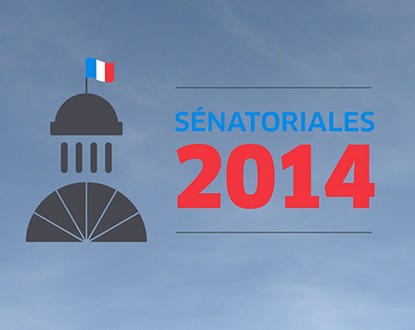This Sunday, September 28, senatorial elections will be held. Half of the Senate, which consists of 348 members, needs to be renewed. In the Alpes-Maritimes, there are five positions to be filled and eight lists running. Since the voting is by list, the 2,031 voters cannot mix candidates from different lists.
 The UMP list led by Dominique Estrosi-Sassone is a strong favorite and, based on voter calculations, should secure at least three seats.
The UMP list led by Dominique Estrosi-Sassone is a strong favorite and, based on voter calculations, should secure at least three seats.
The other two seats will be contested between the remaining two UMP candidates and Jean-Pierre Leleux, the outgoing senator and former mayor of Grasse, who is presenting a “parallel” right-wing list to the UMP’s, Olivier Bettati, a former UMP member from Nice leading a dissident list, and Marc Daunis, the socialist mayor of Valbonne, who is also outgoing.
How it works:
Unlike legislative or presidential elections, senatorial elections are conducted by indirect suffrage: senators are elected by major electors, more than 90% of whom are municipal councilors. Added to these are deputies, general councilors, and regional councilors, making a total of 87,534 voters for these 2014 senatorial elections.
Half of the Senate is renewed every six years. The September 2014 series includes 58 metropolitan departments, one overseas department, four overseas collectivities, and six of the twelve seats for the French citizens living abroad. In total, 178 senators need to be elected out of the 348 that make up the Upper House.
These elections combine two types of voting:
• Two-round majority voting in departments that elect only one or two senators, and in overseas territories. For the 2014 election, majority voting concerns 59 seats. The first round takes place on Sunday morning, the second in the mid-afternoon.
• Proportional representation in departments where three or more senators are elected, as well as for senators from French citizens abroad. For the 2014 election, this type of voting concerns 119 seats. This is the case for the Alpes-Maritimes.
Progress for gender parity
Since the law of June 6, 2000, proportional voting is subject to a parity constraint: lists must alternately include a man and a woman, or vice versa.
The application of this rule increased the share of female senators from 5.6% in 1998 to 10.6% in 2001, reaching 23.2% on the eve of the 2014 election. Concerning majority voting, the law of August 2, 2013, now requires that the candidate and their substitute be of different genders.
What political consequences will arise from this election?
The left, which has had a majority in the Senate since 2011 (which is unusual for an assembly traditionally leaning right), risks losing. “Victory is within our reach,” says former Senate President Gérard Larcher (UMP), who is running for a return to the “plateau,” the nickname for the Senate presidency. “I foresee 8 to 10 more UMP senators and 6 to 8 additional centrists,” he details, totaling at least 177 right-wing senators, while the majority at the Luxembourg Palace requires 174 seats.
For the president of the PS group in the Senate, Didier Guillaume, also a candidate for the presidency, “it will be close”: according to him, with the divisions of the right, the rise of the National Front, and new voting rules, the Senate could remain left-leaning. “The atmosphere is not good,” admits a heavyweight socialist in the Senate, as cited by AFP. Besides the national situation, elected officials are cooled by territorial reform, the school timetables reform, or the reduction in financial resources for local authorities.”
If the right wins?
It would be less troublesome than a cohabitation but not painless either. Senators participate in the “parliamentary shuttle”: they can amend texts passed initially by the National Assembly, although deputies retain the final say.
Despite an essentially consultative role, “the Senate has the power to impede (…), its only real power lies in its inertia,” analyzes Slate.fr.
Who will be the next President of the Senate?
The current Senate President is Jean-Pierre Bel, a PS elected from Ariège. “Without regret and without remorse,” he decided not to run again. Who will succeed him? On the right, UMP senators Jean-Pierre Raffarin, Philippe Marini, and Gérard Larcher (already President of the Senate from 2008 to 2011) are campaigning. The left can count on the candidature of socialist Didier Guillaume.
Let us not forget that the President of the Senate is the number 2 in the Republic: if the head of state leaves office or passes away, it is the Senate President who ensures the transition until a new election.



